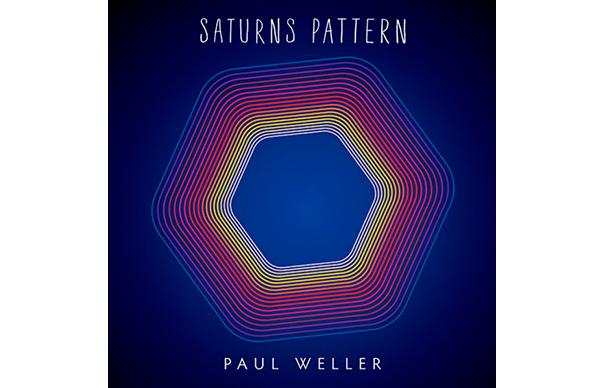Last May, Paul Weller explained how his writing processes have changed over the last few years. Sitting in a busy west London café, Weller told Uncut that the demands of a young family coupled with his own restless spirit had found him abandoning traditional songwriting methods in favour of less familiar practices. “I needed to look for different ways of writing,” he outlined over the chatter of the lunchtime crowd. “A good song is a good song whichever way you do it. I know I can do it in the more traditional way. But I’ve also learned that there are other ways of doing it.”
Recently, these “other ways” have manifested themselves as creative sessions at Weller’s Black Barn studios in Ripley, Surrey where the nine songs on Saturns Pattern were formed. Weller is on a roll at the moment, and Saturns Pattern feels like the fourth in an ongoing series of experimental albums, beginning with 2008’s 22 Dreams and including 2010’s Wake Up The Nation and 2012’s Sonik Kicks. While those albums involved rewarding digressions into Krautrock, pastoral psychedelia, dub, freeform jazz and electronia, Saturns Pattern – Weller’s 12th solo album – is characterized by cut-ups and sound collages, built around riffs and grooves. There are fade outs and fade ins mid-song, vocals come heavily treated, instruments are strafed with sound effects; essentially, Weller is making a virtue of his processes here.
Such progressive thinking is evident in the first 60 seconds of the album’s opening track, “White Skies”, which shifts from an ambient intro to metallic-sounding guitar riffs, crashing “Kashmir”-style drums and electronically-treated vocals. The heavy lifting here has been done by the Amorphous Androgynous, who appear to have succeeded the Chemical Brothers as the go-to remixers for rock stars looking to free their minds: Noel Gallagher among them. Indeed, Gallagher once promised us an album produced by Amorphous Androgynous, but shelved it in favour of the pedestrian High Flying Birds. Weller himself worked on a further seven tracks with Amorphous Androgynous, but only “White Skies” make it onto the album. Whereas Gallagher’s decision implied a chronic reluctance to abandon a successful formula, in Weller’s case “White Skies” appears to be a catalyst for something more evolved and expansive.
“Saturns Pattern” arrives on a sprightly piano refrain and uptempo bass lines, with Weller apparently embracing his inner astrologer, “You gotta clear the decks / It’s Saturn’s peak”. But there is a fake fade out, a treated harmonica and percussion loops; it’s hard not to draw the conclusion that Weller is willing to push any song into experimental territory, if only to see what happens. Even the rather pretty piano ballad “Going My Way” is spun out in unexpected directions. From its deceptively placid beginning, it’s animated with Beach Boys-style multi-tracked vocals and a pastoral folk interlude before guitars forcefully drive it towards a crescendo. “Long Time” continues the album’s momentum; it’s dense riffs recall Bowie’s “Suffragette City” while intriguingly, Black Barn’s long-serving studio manager Charles Rees is credited with “egg whisk”. Incidentally, “Long Time” also features slide guitar from the Strypes’ Josh McClorey, one of only a handful of guests on Saturns Pattern. Unlike the storied cast list on his recent records – Kevin Shields, Graham Coxon, Noel Gallagher and Bruce Foxton among them – this is comparatively low key business: McClorey, Syd Arthur’s Liam McGill and Raven Bush alongside old Jam cohort Steve Brookes.
Perhaps, though, the work done by co-producer Jan “Stan” Kybert – who also receives five music co-writes – shouldn’t be overlooked. A Black Barn veteran since 2002’s Illumination album, Kybert now seems to have been promoted to the role of chief creative foil previously occupied by Brendan Lynch and Simon Dine. If Kybert brings anything new to the party, it is a discrete refining of Weller’s anti-formula formula.
The album’s centerpiece is “Pick It Up”, an ambitious, 6 minute psych-soul opus that brings to mind Minnie Riperton’s “Les Fleurs” or the Rotary Connection. Guitars and Hammond swirl round a layered vocal chant – “Rise / As we / And we go / As we go / Rise”. If “Pick It Up” appears steeped in a kind of Sixties vernacular, it’s tempting to view “I’m Where I Should Be” as the 56-year-old Weller reflecting on matters closer to home. Unlike the impressionistic cut-up lyrics on the rest of the album, “I’m Where I Should Be” finds Weller adopting a more literal approach. “I know exactly why / I’m where I should be / Not trapped by the burden of parody”, he sings over a taut bassline and vaguely New Order-y guitars and synth. The summery “Phoenix” – “The blue of the sky / The cool of morning” – scoots along on chipper Northern Soul keys and tight grooves while Weller lays out an upbeat and positive message: “The birds and bees / The sun through the trees / There’s a scent in the air / And beauty everywhere / I find it”.
The albums last two songs, “In The Car” and “These City Streets”, share a thematic link – travel – but also the guitar work of Steve Brookes. Predictably, “In The Car” shifts from bluesy beginnings to a more full-on glam stomp via a brief folky stop-over. “I could spend my summer nights / Driving round the M25” he sings. “I’m self contained / And the music’s loud / No one can get in / And I don’t wanna get out”. Saturns Pattern closes with the 8 minute “These Streets”. Ostensibly a love song – “I look into your eyes / And I know why / I’m in love with you” – it is more an exercise in sustaining a consistent tone (moody, epic) than continuing any of the investigative compositional techniques on the rest of the album. “We still got a way to go…” Weller sings as the song fades out: a statement of his creative endeavour, perhaps, as much as anything else. Wherever next?
Follow me on Twitter @MichaelBonner



